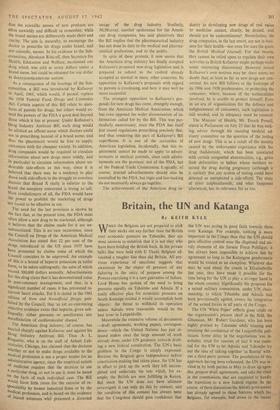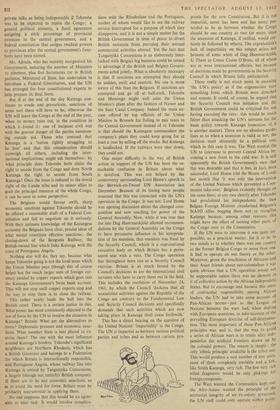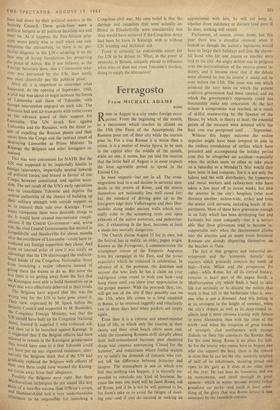Britain, the UN and Katanga
By KEITH KYLE
WHILE the Belgians are not prepared to stick their necks out any further than the British over economic pressure on Tshombe, they are most anxious to establish that it is not they who have been holding the British back. In the private talks that were held with U Thant, Belgium ad- vocated a tougher line than did Britain. All pre- vious experience of sanctions suggests that awareness by the object of pressure of any faltering in the unity of purpose among the Powers exercising it is a sure guarantee of failure. Lord Home has spoken of the need to bring pressure equally on Tshombe and Adoula. If a really effective plan for economic pressure on South Katanga existed it would accomplish both objects: the threat to withhold its operation unless Adoula were reasonable would be the best lever in Leopoldville.
Meanwhile the extensive volume of documents —draft agreements, working papers, correspon- dence- which the United Nations has just re- leased makes clear the large amount of work already done, under UN guidance, towards draft- ing a new federal constitution. The UN's basic problem in the Congo is simply expressed. Because the Belgians gave independence before constitution-making had taken place, the UN has in effect to pick up the work they left uncom- pleted and undertake the role which, for ex- ample, the British are now fulfilling in Kenya. But since the UN does not have ultimate sovereignty it can only do this by consent, and the condition of this consent has always been that the Congolese should gain confidence that the UN was acting in good faith towards them over Katanga. For example, nothing is more important in the Congo than that the UN should gain effective control over the dispersed and un- ruly elements of the former Force Publique; it has always been impossible to achieve this by agreement so long as the Katangese gendarmerie would be treated as an exception. Whatever else may be said about the events in Elisabethville last year, they have made it possible for the time being for the UN to play a stronger hand in the whole country. Significantly the proposal for a mixed military commission, under UN chair- manship, to which Tshombe and Adoula had both provisionally agreed, covers the integration of the armed forces in all parts of the Congo.
The UN 'White Paper' reflects great credit on the organisation's present chief in the field, the Ghanaian, Mr. Robert Gardiner, who has been highly praised by Tshombe while winning and retaining the confidence of the Leopoldville poli- ticians. Some delay in the negotiations was in- evitable, since for reasons of tact it was essen- tial for the UN to let Adoula and Tshombe try out the idea of talking together 'as Bantus' with- out a third party present. The possibilities of this approach having been exhausted, the UN was in- vited in by both parties in May to draw up agen- das, prepare draft agreements, and take the chair in the commissions that are supposed to handle the transition to a new federal regime. In the course of these discussions the Adoula government has already agreed to those features which the Belgians, for example, laid down in the recent private talks as being indispensable if Tshombe was to be expected to rejoin the Congo: a general political amnesty, a fiscal agreement assigning a sixth percentage of provincial revenues to the central government, and a federal constitution that assigns residual powers to provinces after the central government's func- tions have been named.
Mr. Adoula, who has recently reorganised his Government, reducing the number of Ministers to nineteen, plus five Secretaries (or in British parlance, Ministers) of State, has undertaken to introduce a Federal Constitution, and the UN has arranged for four constitutional experts to help prepare its final form.
But if at the end of the day Katanga con- tinues to evade and prevaricate, sanctions of some sort there will have to be; otherwise the UN will leave the Congo at the end of the year, when its money runs out, in the condition in which it found it: one of incipient civil war with the gravest danger of the parties summon- ing outside aid. Those who contend that Katanga is a 'nation rightly struggling to be free' and that this consideration should outweigh all others, including the inter- national implications, might ask themselves : by what principle does Tshombe both claim the right to secede from the Congo and deny North Katanga the right to secede from South Katanga? Once the issue is reduced to the moral right of the Lunda tribe and its minor allies to grab the principal resource of the whole Congo, it can be seen in some perspective.
The Belgians would favour swift, sharp economic sanctions against Tshombe should he be offered a reasonable draft of a Federal Con- stitution and fail to negotiate on it seriously. With their intimate knowledge of the Katangese economy the Belgians have clear, precise ideas of what would constitute effective sanctions: the closing-down of the Benguela Railway, the British-owned line which links Katanga with the coast of Portuguese Angola.
Nothing else will do, they say, because what keeps Tshombe going is not the local taxes which the Union Miniere pays (though this of course helps) but the much larger sum of foreign cur- rency yielded by copper exports which goes into the Katanga Government's Swiss bank account. This will not stop until copper exports stop and The way to stop them is to close the railway.
This rather neatly lands the ball into the British court. There is a certain justice in this. What power has most consistently objected to the use of force by the UN to resolve the situation in Katanga? Britain. What are the alternatives to force? Diplomatic pressure and economic sanc- tions. What member State is best placed to ex- trcise them? The one with the most influence around Katanga's borders. Tshombe's significant neighbours are Northern Rhodesia, which has a British Governor and belongs to a Federation for which Britain is internationally responsible, and Portuguese Angola, whose railway line into Katanga is owned by Tanganyika Concessions, a largely (though not entirely) British company. If there are to be any economic sanctions, so as to avoid the need for force, Britain must be primarily instrumental in applying them.
No one supposes that this would be an agree- able or easy task. It would involve complica-
tions with the Rhodesians and the Portuguese, neither of whom would like to see the railway service interrupted for a purpose of which they disapprove; and it is not a simple matter for the British Government in time of peace to divert British nationals from pursuing their normal commercial activities abroad. Yet the fact that Tanganyika Concessions is so elaborately inter- locked with Belgian big business could be turned to advantage if the British and Belgian Govern- ments acted jointly. What is absolutely necessary is that if sanctions are attempted they should be sudden, swift and resolute. No one is more aware of this than the Belgians. If sanctions are attempted and go off at half-cock, Tshombe and Munongo might well seize the Union Miniere's plant after the fashion of Nasser and the Suez Canal Company. Indeed the main ex- cuse offered by top officials of the Union Miniere in Brussels for failing to pay taxes to the Central Government instead of to Tshombe is that should the Katangese commandeer the company's plant they could keep going for at least a year by selling off the stocks. But Katanga is landlocked. If the railways were shut down, they could not.
One major difficulty in the way of British action in support of the UN has been the re- markable confusion in Britain about what is involved. This was not helped by the controversy surrounding Lord Home's speech to the Berwick-on-Tweed UN Association last December. Because of its timing most people assumed that this was connected with the UN's operation in the Congo. It was not. Lord Home was opening discussion about the changed com- position and new reaching for power of the General Assembly. Now, while it was true that the late Dag Hammarskjold allowed recommen- dations by the General Assembly on the Congo to have persuasive influence in his interpreta- tion of his mandate, that mandate was fixed by the Security Council, which is a supranational executive body on which Britain has a perm- anent seat with a veto. The Congo operation has throughout been run as a Security Council exercise. Britain is as much bound by the Council's decisions as are the international civil servants who have to carry them out in the field. This includes the resolution of November 24, 1961, by which the Council 'declares that all secessionist activities against the Republic of the Congo are contrary to the Fundamental Law and Security Council decisions and specifically demands that such activities which are now taking place in Katanga shall cease forthwith.'
This has a direct bearing on the question of the United Nations' impartiality' in the Congo. The UN is impartial as between various political parties and tribes and as between various pro- posals for the new Constitution. But it is /lot impartial, never has been and has never pre- tended to be as between whether the Congo should be one country or two (or more, since the secession of Katanga, if ratified, would cer- tainly be followed by others). The organisation's lack of impartiality on this subject arises not because of some whim of Dag HammarskjOld, U Thant or Conor Cruise O'Brien, all of whom are or were international officials, but because of decisions made by governments in the Security Council in which Britain fully participated.
There really is not much point in assessing 'the UN's policy' as if the organisation were something from which Britain were detached and remote. It could, of course, be argued that the Security Council was mistaken and the British Government could be criticised for not having exercised the veto : this would be much fairer than attacking the UN's servants for the basic policy towards Katanga (execution of it is another matter). There are no absolute guide- lines as to when a secession is valid or not; the decision must ultimately be a political one, which in this case it was. The West wanted the UN to intervene to prevent Central Africa be- coming a new front in the cold war. It is still apparently the British Government's view that this was desirable and that it has, in fact, been successful. Lord Home told the House of Lords last month that 'it was only the intervention of the United Nations which prevented a Com- munist take-over.' Belgium evidently thought on the same lines; at any rate shortly after Tshombe had proclaimed his independence the then Belgian Foreign Minister circularised Belgium's NATO allies begging them not to recognise Katanga because, among other reasons, this might have the effect of turning other parts of the Congo over to the Communists.
If the UN were to intervene it was quite im- possible, as a practical matter, for it to be in two minds as to whether there was one country in the former Belgian Congo or more than one. It had to operate on one theory or the other. Moreover, given the touchiness of Africans and their Asian friends about neo-colonialism it was quite obvious that a UN operation would not be supportable unless there was an element In it of collective action by the African independent States. But to encourage and harness this sense of continental responsibility among African leaders, the UN had to take some account of Pan-African norms—just as the League of Nations between the wars had, when dealing with European questions, to take account of the prevailing European doctrine of self-determina- tion. The most important of these Pan-African principles was, and is, that the way to avoid a series of African wars is to retain after inde- pendence the artificial frontiers drawn op by the colonial powers. The reason is simple : the only 'ethnic principle' available is the tribal one- This would produce a vast number of tiny units, most of them completely unviable and a few, like South Katanga, very rich. The few very rich tribal fragments would be easy pickings for foreign companies.
The West wanted the Communists kept out; the Afro-Asians wanted the principle Of the territorial integrity of an ex-colony preserved; the UN staff could only operate within guide-
fines laid down by their political masters in the Security Council. These guide-lines were a Political bargain as all political decisions are and must be. As it happens the Pan-African prin- ciple seems pretty wise in itself when one con- templates the alternatives, so there is no par- ticular disgrace in the UN's adopting it as the best way of laying foundations for preserving the peace of Africa. But if one believes, as the Foreign Secretary does, that a Communist take- over was prevented by the UN, then surely one must cheerfully pay the political price.
After all, it is important to remember what happened. At the opening of September, 1960, a civil war was about to begin between the forces of Lumumba and those of Tshombe, with foreign intervention engaged on each side. The Russians had sent air transports with treble crews as the advance guard of their support for Lurnumba. The UN struck first against Lumumba and the Russians, with the direct re- sult of expelling the Russian planes and their crews from the Congo and the indirect result of destroying Lumumba as Prime Minister. In Katanga the Belgians and other foreigners re- mained.
This was very convenient for NATO. But the UN was supposed to be impartially hostile to foreign interveners, impartially neutral towards all political forces, and biased in favour of one Congo, however constituted, and against seces- sion. The net result of the UN's early operations was to consolidate Tshombe and deprive the central authorities of the chance of building up their military strength with outside support so as to reassert their rule over Katanga. From litany viewpoints these were desirable things to do. It would have created international compli- cations if the Central Government—and, worse still, the rival Central Governments that existed in Leopoldville and Stanleyville for eleven months after the overthrow of Lumumba—could have in- troduced any foreign supporters they chose. And leom an internal point of view it was surely an advantage that the UN discouraged the undiscip- lined bands of the Congolese Nationalist Army from launching a major offensive instead of g,iving them the means to do so. But none the tess there is no getting away from the fact that the Katangese were able to build themselves up in Ways that were effectively debarred to their rivals. The Belgians have argued that this was the Wrong way for the UN to have gone about it. Their view, expressed by M. Spaak before the Security Council and supported by M. Bomboko, the Congolese Foreign Minister, was that the °N should have built up the Congolese National Arn1Y, trained it, supplied it with technical aid, and then let it be launched against Katanga. It 13 suggested that if the Belgian officers had been allowed to remain in the Katangese gendarmerie they would have seen to it that Tshombe could not have put up any organised resistance; alter- natively the Belgians think that if the UN had gradually replaced the Belgians with officers of their 017vn these could have weaned the Katang- ese forces away from their allegiance.
Machiavellian the Belgians were right. But these
wlachiavellian techniques do not sound like any lti°re of a sure-fire success than O'Brien's coups, and HammarskjOld had a very understandable reluctance to be responsible for launching a Congolese civil war. My own belief is that the damage and casualties that were actually in- flicted in Elisabethville were considerably less than would have occurred if the Congolese Army had been let loose in Katanga, with or without UN training and technical aid.
Force is certainly an undesirable resort for the UN to be driven to. What, in the event of necessity, is Britain, uniquely placed to influence what does or does not cross Tshombe's borders, doing to supply the alternative?
































 Previous page
Previous page